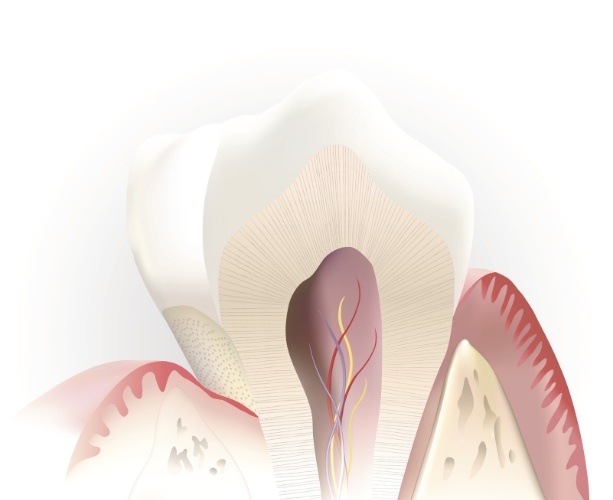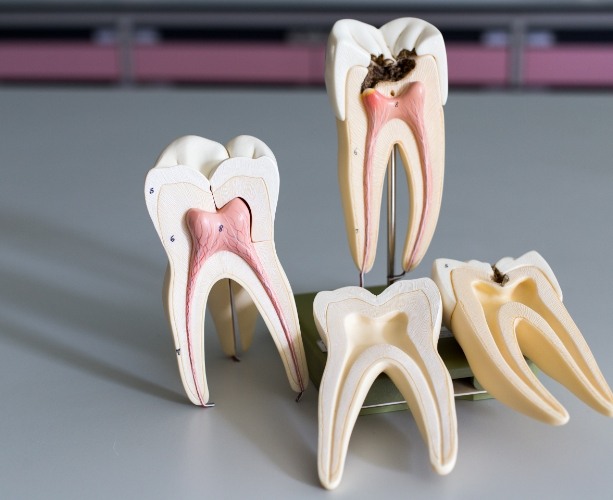Root Canal Therapy – Altavista, VA
Effective Relief for Your Toothache
Do you have a toothache that just won’t go away no matter what you do? If so, it might be time to try root canal therapy. While the words “root canal” might strike fear into some people’s hearts, the truth is that there’s nothing to be scared of when it comes to this procedure. In fact, many patients who have undergone root canal therapy have likened it to getting a simple filling. Thanks to local anesthetic, this treatment shouldn’t hurt a bit. If you’re ready for effective relief for your toothache, give us a call today for root canal therapy in Altavista, VA!

Why Choose Miller & Wolf Family Dentistry
for Root Canal Therapy?
- Dental Sedation Available
- Customized Dental Crowns
- Experienced Team of Dentists
The Root Canal Process

To begin the treatment process, one of our dentists will first numb the area with local anesthetic to ensure that you don’t feel a thing during the procedure. Once you’re nice and numb, we’ll create a tiny hole in your tooth through which we can access the pulp (the inside portion of the tooth where the nerve is housed). The damaged pulp will then be removed, and the interior of the tooth thoroughly cleaned out and sanitized. Next, the pulp is replaced with a synthetic material called gutta-percha and sealed up with a temporary restoration. A few weeks later, after you have fully recovered, we will properly restore your tooth with a permanent crown or filling.
Do You Need
a Root Canal?

Here are the most common signs that root canal therapy is required:
- Sharp, sustained pain in one specific tooth
- Sensitivity to heat or cold that lasts longer than 20 seconds
- Pain in a particular tooth when biting down
- Redness, swelling, or tenderness in the gums around a particular tooth
- A pimple-like bump on the gums near a certain tooth
Root Canal Aftercare

You can expect to feel some sensitivity after getting a root canal, but this is nothing that can’t be alleviated by taking your prescribed or over-the-counter pain medication. Alternatively, you could hold an ice pack to your cheek in 10-minute intervals. Any soreness, sensitivity, and swelling should fade away after a few days. Once the discomfort is gone, you can expect your treated tooth to last for decades to come, possibly even the rest of your life if you stick to an excellent oral hygiene regimen.
Busting Myths
About Root Canals

There is a lot of misinformation out there about root canals. Let’s dispel five common myths about the treatment:
Myth #1: Root Canals Are Painful
Actually, most of the pain that people associate with root canals comes from the toothache before the procedure, not the procedure itself. We’ll be sure you’re numbed up with local anesthetic before starting root canal therapy.
Myth #2: Root Canals Cause Illness
There is actually no evidence to support this myth. There is, however, evidence to support the fact that people who have undergone root canal therapy are not at a higher risk for any kind of illness than people who have not had root canals.
Myth #3: Pregnant Women Can’t Have Root Canals
Pregnant women can and do get root canals if necessary. While a small x-ray is required for a root canal, radiation exposure is minimal and the x-ray is aimed at the mouth, not the abdomen area. The local anesthetics used in root canals are also safe for pregnant women.
Myth #4: If the Tooth Doesn’t Hurt, You Don’t Need a Root Canal
Sometimes the tooth’s pulp may be damaged without sending pain signals to the brain. Our dentists are trained to recognize signs of a damaged pulp, even if that doesn’t include pain.
Myth #5: Pulling the Tooth Is Better Than Getting a Root Canal
It’s always best to keep your natural teeth for as long as possible. Missing teeth can put you at greater risk for other oral health problems like jawbone deterioration and further tooth loss. Not to mention, replacing a missing tooth can be expensive. Root canal therapy can save you from those costs.
